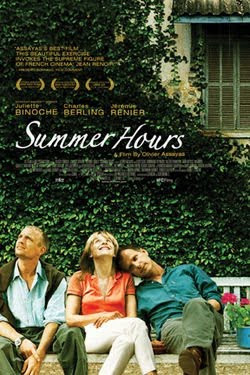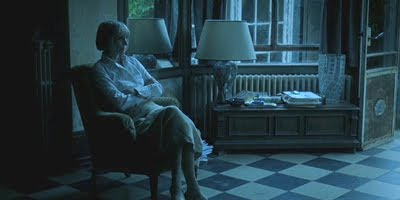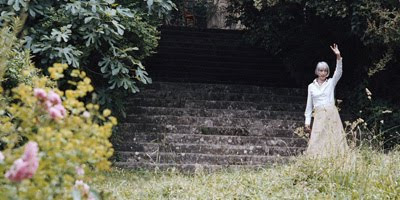 Craig here, taking a look at a recent DVD release.
Craig here, taking a look at a recent DVD release.L'heure d'été. Or, more precisely, how about Summer Hours? A title that rolls delectably off the tongue, eh? Either way, it's a title that conjures up a certain, almost sensory, feeling. There's something nostalgic about it, as if it might recall a specific time in the distant past when warm days and lighter evenings were what we all lived for.
This week saw the Criterion DVD release of Olivier Assayas' beguiling 2008 film, and indeed several scenes, especially the very last one, come almost perfectly close to approximating that wistful, aerated feeling brought on as the remnants of summer fade away. Although, perhaps the title of another recent French film, Private Property, is also apt to describe the overriding themes of Assayas' film. Summer Hours is about the very things given, taken, held close or that may get passed down the family line: objects, keepsakes, the house you grew up in. The film is about these treasurable things, but more so the memories of the people who own(ed) them.
Three siblings - brothers Frédéric (Charles Bering) and Jérémie (Jérémie Renier) and sister Adrienne (Juliette Binoche) - and their families convene on their mother Hélène's (Edith Scob) French country estate, their childhood home, to celebrate her 75th birthday. A feeling of change, of a personal era coming to a close is in the air, as Hélène is insistent about how to go about the business of bequeathing her belongings. Some months later Hélène has passed away and the family have to decide on the matter of dividing up and/or selling the house and its valuable heirlooms - which include some rare artworks (paintings by Corot, panels by Odilon Redon), furniture and drawings bestowed to Hélène by her beloved late uncle, celebrated artist Paul Berthier.

As can often be the way with such deep-rooted family matters, the decision to either pack up and move on, or to keep the house in the family name causes some consternation for the siblings: Jérémie and Adrienne, who live and work abroad (China and New York respectively), are keen to sell, but the older brother Frédéric, who lives in Paris, wants to keep the house. It's a simple premise, yet tied up with several knotty concerns regarding who should get what - and not just confined to within the family; several buyers and collectors also seek interest in the estate. Should what is, or was, theirs remain so, or should they break away and hand ownership to the state?
Now, the ins-and-outs of inheritance issues and family friction may not sound as if it would make for an enlightening ninety-plus minutes, but these familial matters form the crux of the story in an easeful and intriguing manner. The narrative has much to subtly say about generational differences and similarities and the way the valuable oddments of family history carry with them a recollective charge. Is Hélène's cherished bureau better off collecting dust in the old house, or in Paris' Musée d'Orsay (which, incidentally, first commissioned Assayas to make the film, then pulled out later on - but still assisted with the loan of artworks), where it will at least be seen and admired by many, albeit with the remnants of life - photos, notebooks, a lifetime of fading fingerprints - forever wiped away?

Summer Hours, though infused with a sense of pensiveness not much seen in Assayas' work since the latter parts of 2004's Clean, is agreeably scattered with some mirthful moments; it actually does a grand job of interspersing these two aspects throughout its duration beautifully. Such moments where the siblings - allied in their mourning during the practical, often emotionally fraught task of settling their inheritance - recall happy early days together, and bond affectionately over the tough decisions, contain a generous warmth of feeling; despite the matter at hand, there are no clichéd, chest-beating rows over who deserves what. And one effortlessly elegant scene, where their longtime housekeeper Éloïse (Isabelle Sadoyan) walks the perimeter of the empty house trying to find a way in - whilst Assayas' camera pans to track her path from inside the house - is achieved through a single, wordless take which manages to both plaintively suggest closure and foretell a hopeful new chapter, for both family and residence.
The entire cast are uniformly excellent, and, fittingly, work as a convincing family unit - though special mention should go to Berling as the older brother (his character's arc is followed more closely than the rest); and it's nice to see Eyes Without a Face's Edith Scob in a touching, pivotal role. There's so much on offer, both visually and narratively, to savour in Summer Hours. Assayas has made a film that takes its time to reveal the intricacies hidden within those special, memorable moments in life; the almost Zen-like placidity of his direction creates an appealing air of melancholy like few other recent films. If it sounds too twee or overly sentimental, it isn't - and the moneyed milieu of the setting contains no air of superiority: ultimately its themes, regardless of class, strike a universal chord. It unabashedly says, We only have these things in our lives for a fleeting amount of time - make the most of the people who provide the unforgettable hours while they surround us.

With the start of sunny season just about to take hold, what better time than to take a look at one of Olivier Assayas' very best films. Does anyone fancy spending a few summer hours in the kindly company of blond Binoche and kin?




11 comments:
Man, your post almost brought me to tears. I treasure this movie experience so much. I saw it in an almost empty theater on a cloudy day and there was just a couple of old people sitting behind me. I'm 28, so it 's important for me to be reminded of themes such as the ephemeral value of objects and the appreciation for human life.
Great post and film! It's definitely Assayas' best work, don't understand why it's not much appreciated in France.
I watched this film with my best friend and were really surprised by how universal it is. We are both Chinese and our families had almost the exact same experience with our parent's house after they past away. It hit us so hard and we could not stop talking about it for days.
What a good movie, I watched it for the first time this past Monday! It seems like the older brother is of a generation than his other siblings (or at least the youngest brother). Sometimes, as the youngest myself and second youngest when counting cousins, you do feel like you're in a different generation than even the older cousins. I think the film portrays that beautifully.
Nathaniel, I have a question for you: I'm going to have to see The Kids Are All Right with my mom because I won't be 17 by the time it comes out. On a scale of 1-10, how awkward will that be (seeing as you've seen it already)?
Ok. This is one of my favorites films of last year, only behind the white ribbon and bright star. A beautiful and intelligent film.
@Michael -- it depends on what your relationship is like with your mom. I would have died if i saw it with my mom -- there's a lot of sex & language -- but then again, my mom is really only old enough to watch G rated movies. the Mormon thing you know. ;)
@Craig -- thanks for posting this. Great movie. I sometimes wonder if there hadn't been a A Prophet if France would have submitted this. Assayas is such an interesting director and this is SO different than his others. Or at least than the ones I've seen.
Best movie of 2009. I think so. Nice piece.
Juliette Binoche and Edith Scob should have been Oscar nominees for this film.
Nathaiel, Summer Hours in a 2008 film and the French people choosed between this film and the Palm d'Or "THe Class"
anon -- oh. ok. I prefer The Class. But they're both excellent films that everyone should see.
Beautifully written, Craig. Reminded me how much I liked this movie, and Assayas movies in general.
Post a Comment